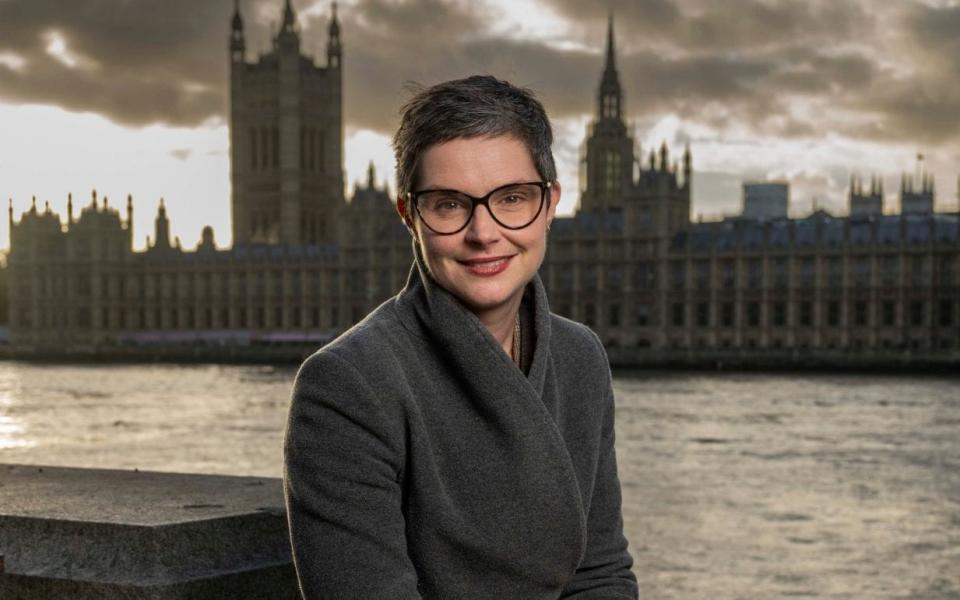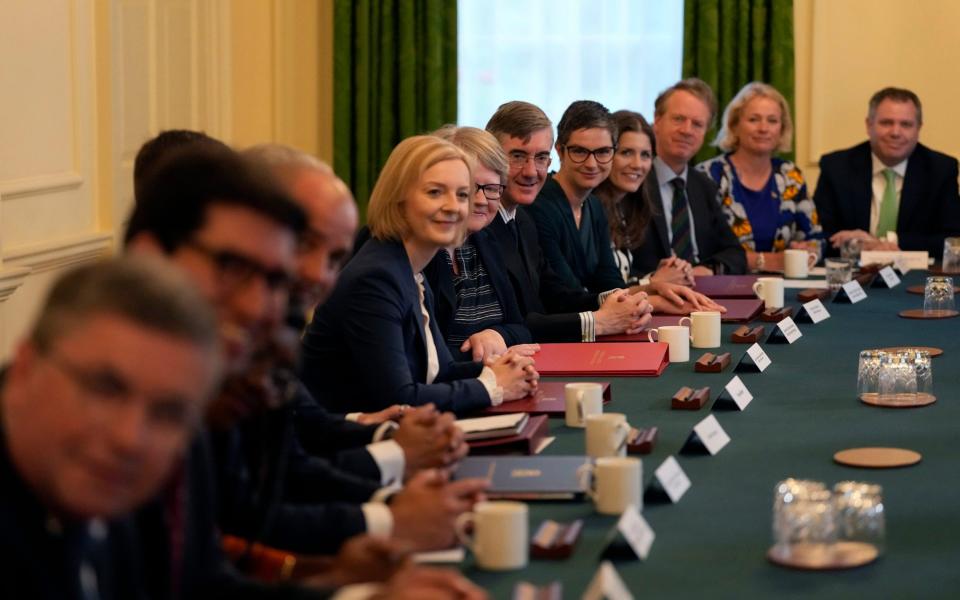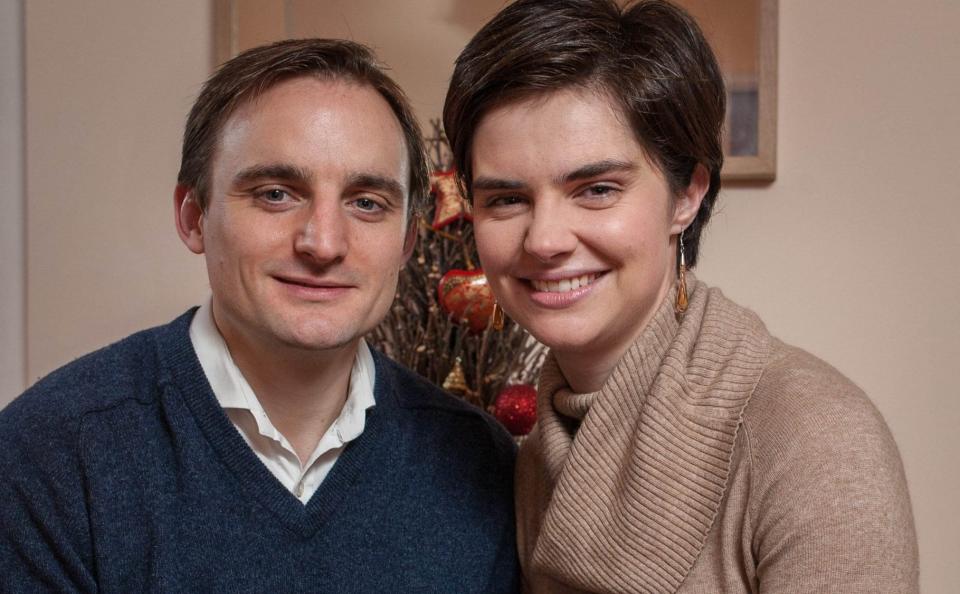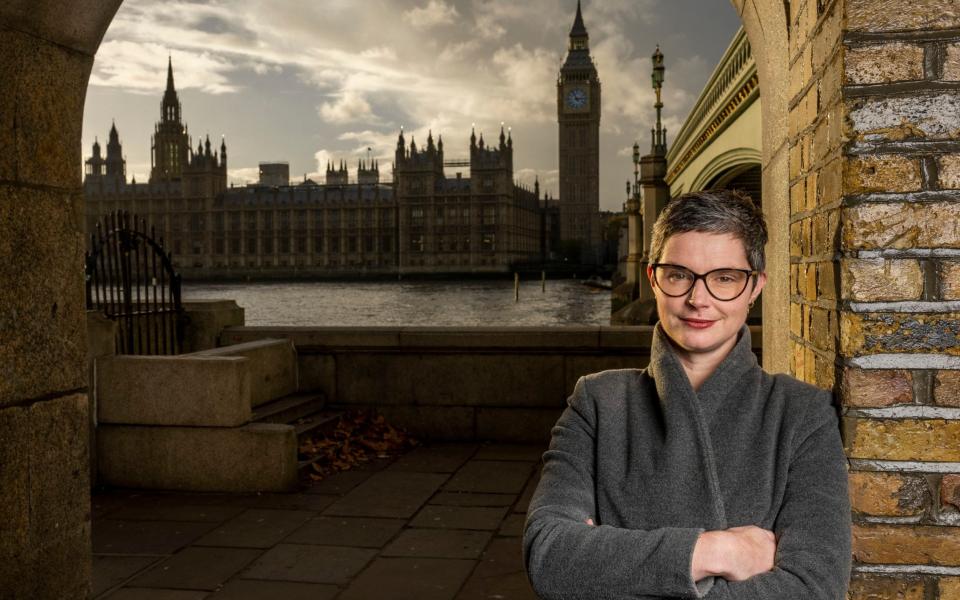‘They were pretty rough scenes’: Tory MP Chloe Smith on Truss’s fall, and leaving politics

“There was an intensity in the air.” That is the typically understated recollection of Chloe Smith as she reflects on the fall of Liz Truss’s government last month. Sitting on the Tory frontbench in the House of Commons, Smith had a ringside seat as a bungled attempt from Downing Street to stop Conservative MPs rebelling over fracking descended into farce.
By 9pm, it was clear that the Government’s authority had completely collapsed. Truss’s chief whip resigned and then un-resigned; rumours spread of some MPs being dragged through division lobbies by heavy-handed colleagues, while others were seen sobbing on the Thameside terrace adjacent to one of the Palace of Westminster’s bars.
“They were pretty rough scenes, which I don’t think I’d seen the like of in my previous time here,” remembers Smith, who has now returned to the backbenches after her 45-day stint in the Truss administration as work and pensions secretary. “It was surprising and a bit shocking. But I think actually, in some ways, it was the culmination of a lot of people’s intense feelings about what had been going on. It felt like something that would require a lot of repair and care to get right and to be able to bring the parliamentary party back together again.”
It was not to be. Just hours later, Truss gave her resignation statement from Downing Street and triggered the second Tory leadership race in three months. This week, as Rishi Sunak turns his eye to policy priorities after the Autumn Statement, the key players in Westminster can be heard whispering disbelievingly that politics may have returned to something approaching “normal”.

But the ramifications of Truss’s self-implosion are still being felt – and some MPs have decided now is the time to throw in the towel entirely. Smith, 40, is one of the first to announce she will be standing down at the next election, vacating the Norwich North seat she has held for the past 13 years. The constituency has a majority of less than 5,000, and was held by Labour between 1997 and her election in 2009 – which could have made her decision not to fight another wearying campaign easier.
The Conservatives are bracing themselves for an exodus. Tory MPs have been given until December 5 to inform their party whether they plan to run again at the next election – expected in mid-2024 – and many younger members are considering making a go at a second career. Older colleagues remember the Conservatives’ years in the wilderness, before David Cameron’s 2010 election victory, and some prefer the thought of an early retirement to another spell of opposition. Others have been spooked by recent changes to constituency boundaries that will be in force by the time the next election takes place.
Dehenna Davison, 29, the levelling-up minister; Sir Gary Streeter, the MP for south west Devon; and William Wragg, the senior Tory backbencher, also announced this week they planned to stand down, while at least four names of other MPs considering retirement from politics are being kicked around in parliamentary corridors. Some estimate the true number of departures could be as high as 80 – although government loyalists insist that suggestion is far too high.
Outside the door of Smith’s House of Commons office – where she is marking her departure with a Telegraph interview – a stack of boxes of her belongings are waiting to be unpacked, after being ferried from the more luxurious setting that she occupied as Cabinet minister just weeks ago.
Despite the popular consensus that Sir Keir Starmer will win the next election, Smith says her plan to stand down is “entirely a personal decision” and has more to do with her two children than her party’s position in the polls.
“The next five years are their years in primary school,” she says. “I want and ought to be able to be there and play a really full part in family life.
“I don’t think people need to load additional significance onto my decision. Mine is purely for personal reasons, and, you know, in part comes about from a strange coincidence of having entered the house at an unusually young age.
“I’ve been very lucky to have done that, and therefore to have completed a big chapter of public service in my 40s.”
So far, Smith’s life as a mother of two has not been entirely conventional. Known as the Commons’s “Baby of the House” when elected aged 27 in 2009, within two years she was the youngest minister in government, and tipped as a rising star.

Her two periods of maternity leave in 2016 and 2019 were bookended by ministerial jobs in the Treasury, Northern Ireland Office, Cabinet Office and Department for Work and Pensions.
She admits that working in Tory administrations under four prime ministers has put pressure on her and her family.
“I think all MPs would say yes to that question, because actually, the nature of living and working in two places in your constituency and then Westminster naturally takes a toll on how you can arrange your family life,” she says.
Her husband is Sandy McFadzean, a financial services boss, whom she proposed to in 2012 after a whirlwind romance lasting just four months – they married in South Runcton, Norfolk, not far from where Smith grew up. She says that McFadzean, who left the Parachute Regiment, and runs triathlons at the weekend is “extremely supportive” of her trying work schedule.
“In my particular case, I’ve had both our children, who are six and three, while I was an MP and so it’s not that I knew any different from before.
“But I can see now that there would of course be continued pressures on what I want to do with my children if I carried on in this role.”
As a family, the biggest challenge came when, in late 2020, after Smith found a lump in her breast she was diagnosed with breast cancer – something which came as a huge shock to the MP, who was fit, healthy and a keen walker and cyclist. She took the decision to work throughout her seven months of treatment, which included chemotherapy, a mastectomy and reconstructive surgery (even when told it would take six weeks to recover and she would be unable to lift her daughter), answering constituents’ emails and performing her role as minister for the constitution.
Most concerning for her was her family’s reaction to her diagnosis, “because actually when everything boils down, that is the most important thing. In the ways that you can, you just try to reassure your children and your wider family and to spend time with them,” she says.
Her children, who were too young to understand what was happening, looked on with curiosity as their mother lost all her hair. “There is actually at least one drawing done by my son, who I think was four at the time, where he’s drawn a picture of his family,” she recalls now, with a laugh.
“There was mummy and daddy and the two children, and basically my head was like an egg. Mummy was an egg in this picture.”

Throughout though, what kept her spirits up was the support of her friends.
“The thing of the moment was a postable brownie box. And I remember there was a point where the freezer was actually overflowing with brownies because so many lovely people had sent them to me.”
It was not the first time Smith had been forced to juggle illness, her family commitments and politics under the glare of public scrutiny.
In June 2012, she rose to fame as the then junior Treasury minister after being savaged by Jeremy Paxman on Newsnight over George Osborne’s plan to defer fuel duty. In what became known as a car crash interview, the famously bullish Paxman grilled her about which ministers had known of the plan, before asking baldly: “Do you ever think you’re incompetent?”
The next day’s headlines screamed of her “mauling” and accused George Osborne, then the Chancellor of the Exchequer, of cowardice for sending a 29-year-old junior minister out to defend a controversial and last-minute policy change.
One Tory, noting that she had also floundered in an early evening interview on Channel 4 News, remarked: “Whoever allowed her out again on Newsnight at 10.30pm should be taken out and shot.”
She not only survived, but prospered, however. Ten years on, Smith describes the incident as a learning experience but says she was unfazed, because it was “hardly the most important thing happening in that very week”.
“My father was having cancer treatment and so actually, my focus was slightly more on the fact that he was going in for a bowel cancer operation than on the kind of vagaries of Newsnight. Politicians are human beings, after all, and human beings learn, and if you don’t learn then you’re not doing it right.”
Her parents met at art school, her mother became a textiles teacher and her father a furniture designer and it was her father, who is deaf, who inspired her work on the British Sign Language Act, originally a private members’ bill introduced by Rosie Cooper, a Labour MP, that she sponsored in her role as a disability minister.
The family moved to Norfolk when she was three years old, and she grew up in the area she would later serve. Paving the way for a career in politics, she worked briefly for Tory heavyweights Gillian Shepherd and Bernard Jenkin.
Smith acknowledges that she was lucky her cancer was caught early and that it could be treated – but that others are not so fortunate. “I regard myself very lucky in terms of not having had to really look into those depths,” she says, when asked if she thought she would have had regrets about her work-life balance if the worst had happened.
“However, all around you, when you are having such serious treatment, you see examples of people who are having to consider the worst possible things for them and for their families.”
Last month was the NHS’s worst month on record for waiting times on almost all metrics, including cancer care and routine surgery.
Although the Government’s target of beginning cancer treatment for 85 per cent of patients within 62 days has not been met on a national level since January 2016, there has been a marked increase in waiting times since the coronavirus pandemic.
Meanwhile, a recent study showed Britain performed poorly on cancer survival rates when compared with high-income countries with universal healthcare, including Denmark and Norway.
Smith, who is keen to emphasise that women should check regularly for lumps and irregularities in the hope of catching cancer early, says the time patients wait after diagnosis is “deeply troubling”.
Although her treatment is now completed, she will continue to take a course of tamoxifen for the next five years to prevent the cancer returning.
“I had really great NHS treatment at the speed that everybody deserves it, [but] I’m very worried for my constituents and for others – the same is not true now,” she says.
“I think the Government is doing the right things in trying to fix those backlogs … it is the Health Secretary’s top priority, and I think that’s absolutely right. But I think they will have to keep up that focus for a very long time to make sure that it’s seen through.”

Despite announcing she is planning to stand down, Smith is keen throughout the interview not to criticise her Conservative colleagues – stopping one answer about her early days in Parliament after thinking she has accidentally described David Cameron as “average”.
Truss, likewise, is praised for her “realism” when confronted with the horror of financial markets at her mini-Budget, her “dignity and strength” in telling the public she planned to resign and her history of working with constituents in her South West Norfolk constituency.
She also says the pair have been in touch since the collapse of the Government they served in – and that Truss has “taken care to thank her team and to make sure that we know we were valued for the roles we were trying to deliver”.
Her criticism is instead reserved for events and processes – not people – as she strikes a diplomatic tone. Even striking nurses, who she says will make the NHS delays worse, are not criticised directly and while it is a “great shame” the industrial action has been launched, “all sides” must get around the negotiating table.
She is most animated when discussing an issue she worked to legislate on while serving in the Cabinet Office: the violent abuse and harassment of MPs.
The last time we met, she spoke of being “alarmed” by a nighttime “ambush” in a car park by angry constituents. “It was an ambush out of the back of a meeting,” she told me. “And what was particularly sad about it was that I was actually accompanied by somebody who was, in fact, nothing to do with anything in politics – they bore the brunt of it as well.” In 2019, Richard Hayes was jailed for five years after admitting sending her and other MPs fake anthrax in the post.
As constitutions minister, Smith shepherded the controversial Elections Bill through Parliament last year – which criminalised the intimidation of candidates at elections. So does she think that in her time in Parliament, during which Jo Cox was murdered on the streets of her West Yorkshire constituency in 2016, the problem has improved?
“You can only conclude that it’s got worse, and the evidence for that is the fact that several colleagues have been murdered during my time,” she says.
“I can’t think of very many other careers where you would have to say that. That is an appalling conclusion to have to come to. I think there is a great deal we can all do to make sure that we restore civility to politics and to democracy.”
Chief among them is encouraging more people to consider standing as MPs, as she did aged 25 when – as a Deloitte consultant not long graduated from the University of York – she was selected as a Conservative prospective parliamentary candidate.
“We have to work hard to make sure that it stays as good as people need it to be, and to achieve that we need really great people to come into public service,” she says.
“I would encourage many others to follow in my footsteps or in the footsteps of everybody who’s served in Parliament.”
Now, she is faced with a choice on what to do next – as life as an ex-MP beckons. Former politicians make names for themselves in all sorts of professions, but often in roles that include advising companies and lobbyists on how to navigate the world of Westminster.
Smith is silent about her future plans, and will not even divulge whether she has begun to look for another job. As we walk back across Westminster Bridge, where she was photographed for this interview, she laughs at the early evening sun over the Palace of Westminster and remarks it is fitting that she should be discussing her departure from politics in front of the setting sun.
“It isn’t really a sunset yet,” she says, hinting that her next move could be somewhere closer than we expected. “I like to think of it as still being midday.”

 Yahoo Sport
Yahoo Sport 





































